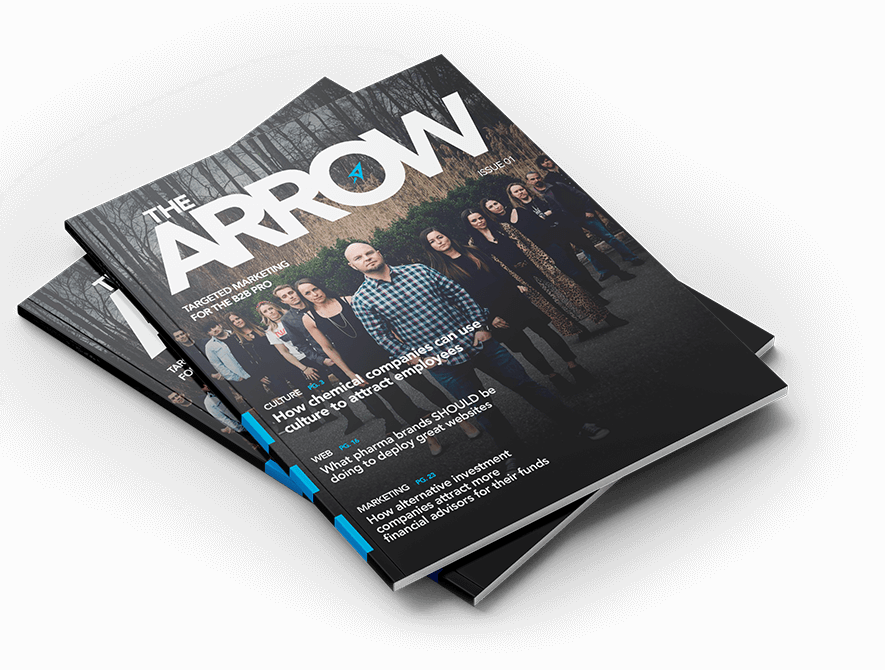Top 5 Reasons Web Design Agency v Freelancer Has One Clear Winner
Chris Mulvaney is the CEO of CMDS. I make things... I’m the creative entrepreneur with passion for (re)making brands and inventing solutions to problems no one knows exist.
If you’re asking why the web design agency v freelancer question matters to your business, then you may not fully grasp the critical benefits that your website can offer.
Websites are by far, the most effective marketing tool in any organization’s portfolio. These pieces of digital real estate serve the same function as brick-and-mortar locations in the real world. They provide a consolidated storefront, where people can go to learn about your offerings and overall brand. But while a physical outlet might only be able to serve nearby customers, your website can reach prospective buyers from across the globe. That translates to a potential audience of 3.4 billion users per day.
Last year almost 75% of these users initiated purchases through the Internet. While online business interactions contributed a further $0.56 to every dollar spent on offline purchases.
In an increasingly connected world, websites offer the accessibility, convenience and ease of communication that modern consumers have come to expect from their favorite brands. From smartphones to tablets and home computers, websites can help you reach customers on a range of devices. Of course, actually engaging these individuals on a consistent basis is another matter altogether.
How the Web Design Agency v Freelancer Question Affects Your Website

According the CMO Council, digital marketing will make up 75% of the average business’s marketing budget within the next five years. Look around and you will see these investments at work across social media, email, search engines and review sites. Every time you try and funnel traffic towards your online storefront you have to contend with all of these competing signals. In the modern business environment, attention is an extremely valuable resource and everyone from small businesses to major corporations like Amazon and Netflix, is trying to capture it.
This is why professional web design is essential for any business that wants to build out its digital presence. An intuitive, aesthetically pleasing website can make the difference between an industry also-ran, and a truly engaging online brand.
Website Design Increases Retention

If you want your digital strategies to pay off, then you need to ensure that your website is set up to convert casual visitors into repeat customers. Without the right visual and functional elements in place, this will prove impossible.
Studies from NN Group show that Internet users decide whether they want to stay or leave a new website within 59 seconds of their first visit. So, if your website hasn’t managed to catch their attention by this point, you’re going to see a precipitous drop in conversion rates no matter how good your products and services are.
The frequency of these exits is measured by a metric known as bounce rate, and it is generally considered to be the most important determinant of website quality. Out of all the factors that influence bounce rate, 94% are design-related while just 6% relate to actual content.
Website design encompasses far more than just images and layouts. It’s about creating a complete user experience that guides your customers from initial engagement to the final conversion in one streamlined workflow.
Amongst other elements you should look for:
- Navigability – When a potential customer arrives on your landing page, they should immediately know where they need to click next in order to arrive at the information they need. The last thing anyone wants to do is waste time finding relevant menu options or hunting around for a purchase button. A well-designed website should present a streamlined interface that encourages continuous browsing.
- Uniformity – Your website is a prime forum for establishing and building your brand. At the core of any branding strategy is a consistent visual theme and message. This means that you need a prominent and identifiable business logo that you can apply to your webpages. You also need a consistent color scheme that helps visitors immediately recognize that they are interacting with your business.
- Images –Statistics show that users spend an average of 5.94 seconds looking at images on a website homepage. If you‘re dedicating this space to generic stock photos and pixilated product images, you will lose your chance at engaging visitors. A visually pleasing website should offer a small number of high-quality images that are relevant to your brand.
- Typography – Visitors generally spend less time reading content than they do looking at images. Nevertheless, content does matter. Website text should be legible and consistent for the most part with differentiated fonts for headings and CTAs.
- Speed – Slow loading times will turn away even the most loyal customers. Almost half of all Internet users believe that websites should take no more than 2 seconds to load, and every second of delay reduces conversion times by an estimated 7%. In terms of search engine rankings, Google’s algorithm rewards websites that are quick to load across all devices.
- Responsive Design – Smartphones now command a larger market than desktops and tablets put together. If your website doesn’t offer a similar or superior user experience to visitors on mobile devices then you’re ignoring a significant portion of your audience. Responsive web design, RWD, standardizes the user experience across a variety of devices based on the pixel width of the display. With RWD in place, you can ensure that your website is optimized for every digital touchpoint.
Who Should Design Your Website?

Now that you’re aware of the importance of a professional web design, the question is: how do you go about implementing these principles into your own website? Unless you have the necessary expertise and technology within the business, chances are that you will have to bring in an outside team. This is where most organizations face a difficult choice. Do you try and limit expenditure by hiring an independent freelancer, or do you budget a little more for a professional web design agency?
Web Design Agency v Freelancer
When it comes to the web design agency v freelancer question, we always recommend the former option for a number of reasons.
1. Proven Experience

An effective website design needs to be tailored to your specific needs. While a freelancer might offer specialist expertise in E-commerce websites or personal blogs, they will not be able to provide the same level of quality on every type of project.
By contrast, professional web design agencies bring a diverse portfolio to every assignment. These companies have experience working with businesses in a wide range of industries and understand how to optimize the visual and functional aspects of your website to best showcase your offerings.
At CMDS, we use a proprietary working process to ensure optimal outcomes for our partners. This process covers an extensive research and planning stage where we work with our clients to understand the main objectives for their website. Whether that involves increasing traffic, driving offline sales or simply increasing overall brand recognition our job is to deliver on those requirements. This research is backed up by formal documentation that lays out everything. From the number of website pages to necessary features (online payment options, video, interactive elements, social media integrations), we cover everything. These plans are then presented to clients alongside detailed budget estimates and timelines for completion.
We are able to accurately adjust inputs according to the client’s needs because our team has worked on projects at every scale and level of complexity. Most freelancers lack the experience and resources to perform at the same level.
2. Multi-Functional Expertise
![]()
We have already covered the variety of factors that contribute to the final user experience. A freelancer may be able to deliver adequate results in some of these areas, but they will lack the skills and training to maximize each aspect of your web design.
At CMDS, we employ a diverse team that comprises digital marketing experts, UX specialists, back-end developers, front-end developers, graphic designers, SEO specialists and project managers. Our development staff can work with a wide array of technologies including: HTML, CSS, Javascript, WordPress, Android and iOS.
This range of coding capabilities allows us to create highly functional websites that perform equally well across multiple platforms. Our digital marketing talent can optimize your layout, navigation and visual elements to attract and engage your core audience, while at the same time ensuring that your website ranks highly for key terms.
Cast a look over industry-leading websites in your space and you’ll find that all of them are designed by creative teams rather than jack-of-all trade freelancers. The fact is that even the most talented individual cannot match the efficiency of a web design agency.
3. Strategic Insights

Website design should follow a clear plan that places the client’s objectives at its core. We’ve already touched on how our research and planning integrates these goals, but there are a number of other factors that influence our web design strategies as well.
First, we talk to key stakeholders and employees within your business to determine their assessment of your current website. These interviews help us figure out which features need to be added to your current website and which areas need to be improved otherwise. After we canvass internal opinions, we work to understand your customers by developing detailed buyer personas for each of your targeted market segments.
We then assess our current plans according to these profiles to see where further adjustments are required. This process might also include test group interviews and surveys that will be disseminated through social media, email and other media channels. This data is combined with analytics from your website and social media.
Once we have a clear picture of where your business currently stands, we can compare this image to your closest competitors to find out what you do better, and what you need to do differently. These comparisons can also help us to establish clear benchmarks for success. From here, we can use our insights to create a tailored design strategy that is suited to your objectives as well as the environment in which your business operates.
Every aspect of our web design will be created according to this strategy.
Freelancers specialize in production. They do not possess the managerial insights or capabilities to design websites in a strategic manner.
4. Long-Term Focus

The web design agency v freelancer argument generally comes down to a choice between cost and quality, but regardless of which option you choose your outlay is still likely to be significant. With this in mind, you need to consider how your investment will pay off in the long-term.
While a freelancer might be able to deliver a website that looks elegant and functions smoothly, will it continue to provide this level of performance in the years to come? After all, hardware and software are constantly evolving and your website’s architecture needs to be robust enough to account for this rapid progress.
If your freelance web designer is not aware of latest UX and design trends. Or they cannot access the latest design technologies then there is a chance that you will require yet another redesign in a few years time. Stability is another issue you may have to contend with as your business grows. The more users you get the more likely it is that technical issues will begin to become apparent on your website. A short-term freelancer will not offer any ongoing support when these problems arise.
By comparison, our professional web design agency is constantly innovating and improving. When we work on a project, we’re not looking to meet current expectations. We’re planning your website according to your future requirements. Our team is up-to-date with the latest trends shaping the industry from AI and IoT to increasing demands for mobility. We combine this long-term focus with a commitment to providing ongoing support. When you work with us you can be assured that your website will continue to function smoothly for years to come.
5. Professionalism and Ethics

Freelancers work on an ad hoc basis with few assurances in place to govern the consistency of their work. Communication on these projects is often informal and if you have hired an offshore freelancer then you might find it difficult to coordinate your timings. As a result, freelancers generally operate without any oversight which can lead to significant fluctuations in the timing and quality of their deliverables.
By comparison, web design agencies work according to clearly documented working processes that are defined during the initial discovery phase of a project. As mentioned above, this documentation usually includes accurate budget estimates and specific timelines for key deliverables. Before any billable work begins, clients already have this knowledge at hand. Once the design team gets to work, project management teams ensure that they are meeting deadlines. Managers are also responsible for maintaining transparent communication with clients. As each stage of the project is completed, deliverables are presented to you for approval and further recommendations. This helps to ensure that the finished product meets your expectations.
Web design agencies will also hand over control of all coding, login credentials and website hosting to the client upon delivery. This stipulation is enforced as standard practice amongst all reputable web design agencies. Freelancers on the other hand have no such policies in place.
The Final Verdict

Our New Jersey-based team can help you answer the web design agency v freelancer question once and for all. Our multifunctional design, development and UX experts will help you build a website that will truly take your online presence to the next level. Contact us today to find out more about our services.





